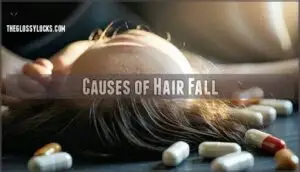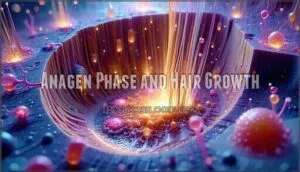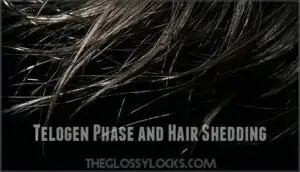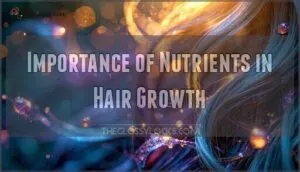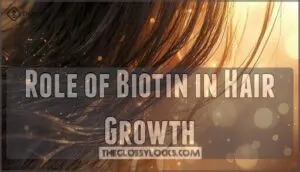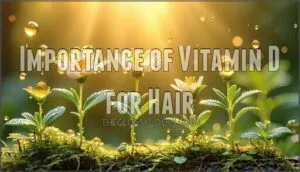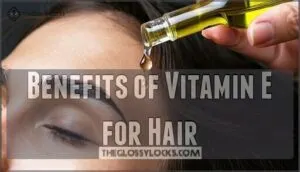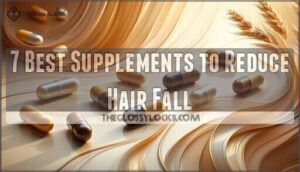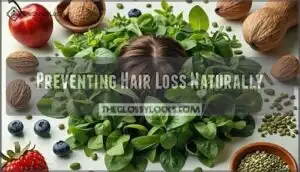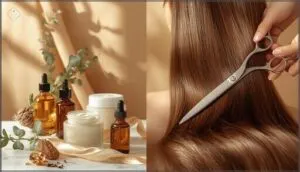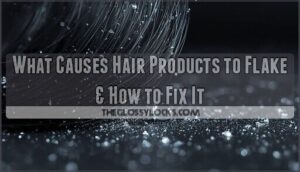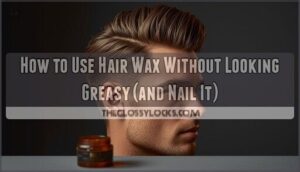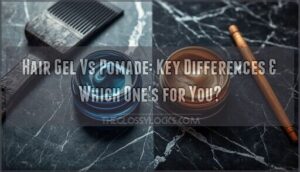This site is supported by our readers. We may earn a commission, at no cost to you, if you purchase through links.
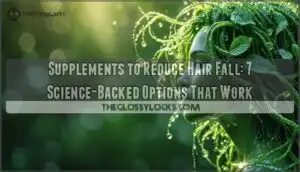
Biotin strengthens your hair structure, while iron prevents the fatigue that often accompanies hair loss.
Vitamin D supports follicle health, and collagen peptides provide the building blocks your hair craves.
Saw palmetto blocks DHT hormone damage, which causes about 80% of hair loss cases.
Think of these supplements as your hair’s insurance policy – they won’t work overnight, but clinical studies show measurable improvements in 8-12 weeks.
The secret lies in choosing the right combination and proper timing for maximum absorption.
Table Of Contents
- Key Takeaways
- Causes of Hair Fall
- Hair Growth Cycle
- Essential Vitamins for Hair
- 7 Best Supplements to Reduce Hair Fall
- Preventing Hair Loss Naturally
- Maintaining Healthy Hair
- Frequently Asked Questions (FAQs)
- What vitamins are good for hair loss?
- Can vitamins help reduce hair fall?
- Can hair growth supplements help thinning hair?
- Should you take supplements for hair loss?
- What vitamins are good for hair growth?
- What are the best supplements for hair fall?
- What is the best supplement to take for hair loss?
- Which vitamin is best to stop hair fall?
- What vitamin am I lacking if my hair is shedding?
- What am I lacking if my hair is falling out?
- Conclusion
Key Takeaways
- You’ll need biotin, iron, vitamin D, and zinc – These four nutrients target the most common deficiencies behind hair loss, with biotin strengthening keratin production and iron delivering oxygen to your follicles.
- Saw palmetto blocks DHT hormone damage – Since DHT causes about 80% of hair loss cases, supplements containing this natural DHT blocker can significantly reduce hormonal hair thinning.
- You won’t see results overnight – Clinical studies show that measurable improvements take 8-12 weeks of consistent use, so do not give up if you do not notice changes in the first month.
- Combine supplements with lifestyle changes – You will get better results when you pair quality supplements with stress management, gentle hair care practices, and a balanced diet rich in protein and omega-3s.
Causes of Hair Fall
Understanding why your hair falls out requires examining multiple factors that can disrupt the natural growth cycle.
Nutrient deficiencies, hormonal fluctuations during pregnancy or menopause, genetic predisposition, medical conditions like thyroid disorders, certain medications, and physical stress from tight hairstyles can all contribute to excessive shedding and weakened hair follicles, which are key factors in hair falls and can lead to excessive shedding and weakened hair follicles.
Nutrient Deficiencies and Hair Loss
Nutritional deficiencies create a perfect storm for hair loss, disrupting your body’s natural growth cycles.
Iron deficiency reduces oxygen delivery to follicles, while vitamin D deficiency affects keratin production. Protein deficiency weakens hair structure, and mineral imbalances disrupt cellular processes.
Poor vitamin absorption compounds these issues, making hair loss supplements essential for addressing underlying nutritional gaps effectively.
Addressing vitamin D deficiencies can improve hair density and reduce shedding.
Hormonal Changes and Hair Loss
Your hormones can wreak havoc on your hair.
Menopause hairloss occurs when estrogen drops, while PCOS hairloss stems from elevated androgens.
Thyroid hairloss affects metabolism, and postpartum shedding happens when pregnancy hormones crash.
DHT impact shrinks follicles, causing thinning.
Androgenic alopecia is the most common cause of hair loss in both men and women.
Hair loss supplements with DHT blockers and hormonal support ingredients offer targeted hair thinning treatment for these specific hormonal disruptions, providing hormonal support.
Genetic Factors and Hair Loss
Does your family tree reveal a pattern of thinning crowns?
Genetic factors drive androgenetic alopecia, affecting up to 50% of adults through inherited baldness patterns.
Your family history determines DHT sensitivity and gene expression timing.
While genetic testing can reveal predisposition factors, you can’t change your DNA—but supplements may help slow genetic hair loss progression.
Hair Growth Cycle
Your hair follicles operate on a precise biological timeline, cycling through distinct phases of growth, regression, rest, and shedding that determine your hair’s thickness and overall health.
Your hair follows nature’s rhythm—growing, resting, shedding—in an endless cycle that reveals your follicles’ hidden timeline.
Understanding this natural process helps you recognize how nutritional deficiencies can disrupt these cycles, leading to increased shedding and slower regrowth that supplements can potentially address, which is crucial for maintaining hair’s thickness.
Anagen Phase and Hair Growth
During this active anagen phase, your hair follicles work like tiny factories, synthesizing proteins and keratin for approximately 2-7 years.
Growth factors stimulate cellular activity while improved scalp circulation delivers essential nutrients to support follicle health.
Hair growth vitamins optimize this complex hair growth cycle, ensuring your anagen duration reaches its full potential for stronger, longer strands.
Telogen Phase and Hair Shedding
Your hair’s telogen phase marks a critical resting period where follicles enter dormancy before shedding occurs.
This natural cycle can become disrupted, leading to telogen effluvium and excessive hair loss when shedding triggers overwhelm your system.
Key factors affecting cycle length include:
- Stress levels – Physical or emotional stress extends telogen phases
- Nutritional deficiencies – Poor diet disrupts normal hair thinning treatment
- Hormonal changes – Imbalances trigger premature follicle dormancy
Reversing shedding requires addressing underlying causes through targeted hair growth vitamins.
Importance of Nutrients in Hair Growth
Your body treats nutrients like fuel for a complex engine.
Without adequate biotin, vitamin D, zinc, and iron, keratin production slows dramatically.
These hair growth vitamins promote healthy follicle health by enhancing scalp circulation and oxygen delivery to roots.
Poor nutrition disrupts collagen synthesis, weakening strands from within.
Think of nutrients as essential building blocks—skip them, and your hair pays the price, highlighting the importance of proper nutrition for healthy follicle health.
Essential Vitamins for Hair
Your hair follicles depend on specific vitamins to maintain their complex growth cycles, produce strong keratin fibers, and resist premature shedding.
Research shows that deficiencies in key vitamins like biotin, vitamin D, and vitamin E can disrupt normal hair production, leading to increased hair fall and weaker strands that break more easily, which is related to premature shedding.
Role of Biotin in Hair Growth
Understanding your hair’s growth patterns leads us to examine specific nutrients that fuel this process. Biotin, also known as vitamin B7, serves as your hair’s building block by supporting keratin production – the protein that forms your hair shaft.
Without adequate biotin, your follicles can’t manufacture strong, healthy strands effectively. Many people find biotin supplement options helpful for hair health.
- Biotin deficiency manifests as brittle, thinning hair that breaks easily at the roots
- Keratin production requires consistent biotin levels to maintain hair follicle health and strength
- Biotin dosage of 2,500-5,000 mcg daily shows effectiveness in clinical studies for hair growth
- Supplement interactions with raw eggs and certain medications can reduce biotin absorption substantially
Importance of Vitamin D for Hair
Your scalp contains vitamin D receptors that directly influence hair follicle health through keratinocyte metabolism.
Low vitamin D levels strongly correlate with alopecia areata and telogen effluvium, two common hair loss conditions.
Research shows that vitamin deficiencies, particularly vitamin D, can disrupt the normal hair growth cycle, leading to increased shedding and weakened follicles that struggle to produce healthy strands.
Many people consider vitamin D supplementation for deficiency.
Benefits of Vitamin E for Hair
Looking beyond vitamin D, vitamin E acts as your hair’s bodyguard against oxidative stress.
This antioxidant defense powerhouse protects follicles from environmental damage while boosting scalp circulation for healthier hair growth. Vitamin E can also balance oil production, and prevent greasiness, but safe usage is key.
Here’s how vitamin E supports hair follicle health:
- Follicle Protection – Guards against free radical damage that weakens hair strength
- Scalp Health – Improves blood flow to nourish roots
- Vitamin E Forms – Tocotrienols show superior hair loss prevention benefits
7 Best Supplements to Reduce Hair Fall
When you’re experiencing hair fall, targeted supplements can provide the specific nutrients your follicles need to strengthen and reduce excessive shedding.
These seven research-backed formulations combine essential vitamins, minerals, and specialized compounds that address common nutritional deficiencies linked to hair loss, offering a practical approach to supporting your hair’s natural growth cycle.
1. WELLBEAUTY OMI Hair Growth Peptides
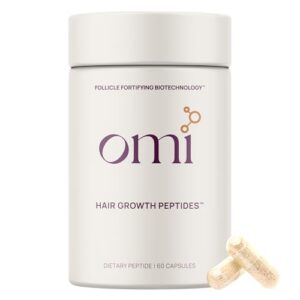 View On Amazon
View On Amazon When hair loss becomes a daily concern, WELLBEAUTY OMI Hair Growth Peptides offer a scientifically-backed solution.
This supplement contains patented Intermediate Filament Peptides with 5X the potency of standard keratin sources.
Clinical trials demonstrate impressive results: an 8X increase in hair growth, 46% reduction in hair loss, and 16X greater resistance to breakage.
You’ll also notice a 59% boost in gloss and shine.
Made from 100% New Zealand grass-fed wool peptides, it’s ethically sourced and designed for once-daily use, making it a convenient and ethically sourced option.
Best For: Individuals seeking a clinically-backed solution for hair thinning, loss, or reduced shine, especially those looking for ethically sourced, drug-free options.
- Clinically proven to increase hair growth and reduce hair loss.
- Made with ethically sourced, grass-fed New Zealand wool peptides.
- Contains natural, drug-free, and sustainably farmed ingredients.
- High price compared to standard hair growth supplements.
- Requires at least three months of consistent use for noticeable results.
- Lack of USP certification or independent third-party testing.
2. Nutrafol Women’s Hair Growth Supplement
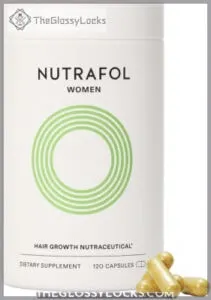
This physician-formulated supplement targets six root causes of thinning hair in women aged 18-44, including stress and nutritional gaps.
You’ll take four capsules daily containing 21 vitamins, minerals, and natural ingredients like ashwagandha and marine collagen peptides.
Clinical studies show 90% of women experienced improved hair growth, while 84% noticed less shedding after six months.
The formula excludes gluten, dairy, and artificial additives, and results typically appear within three to six months of consistent use, making it a thorough approach to hair restoration.
Best For: Women aged 18-44 experiencing hair thinning due to stress, nutritional gaps, or hormonal changes.
- Requires consistent use of 4 capsules daily for 3-6 months to see results.
- Potential side effects like jitteriness or discomfort for some users.
- Relatively expensive compared to other hair supplements.
- Clinically proven to improve hair growth and reduce shedding.
- Physician-formulated with 21 clean, natural ingredients.
- Free from gluten, dairy, soy, and artificial additives.
3. Natures Bounty Biotin for Hair Skin
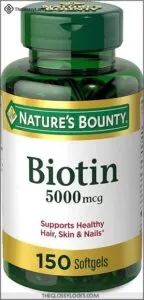
With nearly 50 years of trusted research behind it, Nature’s Bounty Biotin delivers 5,000 mcg of this essential B vitamin in easy-to-swallow softgels.
You’ll find this water-soluble nutrient supports keratin synthesis, the protein that forms your hair’s structure.
Unlike higher-dose alternatives that may cause breakouts, this moderate potency provides effective results without unwanted side effects.
Users typically notice reduced shedding and stronger strands within weeks.
The non-GMO, gluten-free formula converts nutrients into cellular energy while supporting your nervous system’s overall health and providing effective results.
Best For: Individuals seeking to improve hair strength, reduce shedding, and enhance skin and nail health with a moderate-dose Biotin supplement.
- Supports keratin synthesis for stronger hair and reduced shedding.
- Non-GMO, gluten-free, and free from artificial flavors or sweeteners.
- Easy-to-swallow softgels with a well-tolerated 5,000 mcg dosage.
- Effects may take weeks to appear with consistent use.
- Not evaluated by the FDA for diagnosing or treating conditions.
- Heat or sunlight exposure may damage the product.
4. Hairfinity Vegan Hair Growth Vitamins
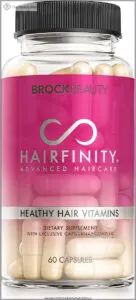
Plant-based doesn’t mean less powerful in the context of Hairfinity Vegan Hair Growth Vitamins. This all-encompassing formula delivers 2,500 mcg of biotin alongside vitamins A, C, D, and a complete B-complex to support your hair’s natural growth cycle.
The exclusive Capilsana Complex combines hydrolyzed collagen, MSM, and horsetail extract for added strength. Manufactured in FDA-certified facilities, these capsules provide essential nutrients that many diets lack.
You’ll get either a one-month or two-month supply to kickstart your hair restoration journey.
Best For: Individuals seeking a plant-based supplement to promote healthier hair growth, thickness, and reduced shedding over time.
- Includes essential nutrients like biotin, vitamins A, C, and D, and a complete B-complex.
- Features the exclusive Capilsana Complex with hydrolyzed collagen, MSM, and horsetail for added strength.
- Manufactured in FDA-certified facilities, ensuring quality and safety.
- Results require consistent daily use over weeks to see noticeable improvement.
- Slightly more expensive than other hair growth supplements.
- Some users reported digestive discomfort or ineffectiveness.
5. Viviscal Hair Growth Supplements for Women
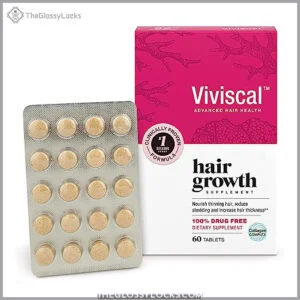
Backed by over 25 years of clinical research, Viviscal stands out as one of the most scientifically validated hair growth supplements available.
You’ll find its proprietary AminoMar collagen complex works alongside biotin, vitamin C, iron, and zinc to nourish thinning hair from within.
Clinical studies show 92% of women experienced thicker hair after three months of consistent use.
Take two tablets daily with food for best results, as this drug-free formula supports natural hair growth while reducing excessive shedding effectively.
Best For: Women experiencing thinning hair due to hormonal changes, stress, aging, or medical conditions who want a clinically proven, drug-free solution.
- Requires daily commitment for optimal results over 3-6 months.
- May cause mild stomach upset or unpleasant aftertaste for some users.
- Higher price compared to some alternatives.
- Clinically proven to increase hair thickness and reduce shedding.
- Contains natural ingredients like AminoMar collagen complex, biotin, and zinc.
- Results seen in as little as 3 months with consistent use.
6. Sugarbear Extra Strength Hair Growth Vitamins
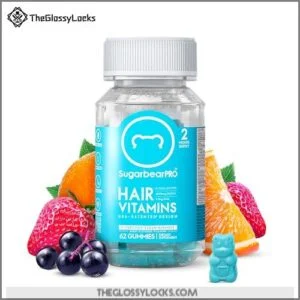
Gummy vitamins make hair care feel less like a chore and more like a treat.
Sugarbear Extra Strength delivers 6,000 mcg of biotin alongside their Smartroot Blend containing elderberry, inositol, MSM, and omega-3 fatty acids.
Users consistently report significant growth after months of use, with some seeing 6-8 inches of new hair and stronger nails.
The berry-flavored gummies contain only 10 calories per serving and are completely vegan.
With a 4.8/5 rating from over 200 reviews, 98% of users recommend this supplement.
Best For: Individuals looking to enhance hair growth, thickness, and overall hair health while enjoying a berry-flavored vegan gummy supplement.
- Missing vitamin B6, which may require separate supplementation.
- Overconsumption risks high levels of biotin or B6.
- Some users find the new smell and aftertaste unpleasant.
- Contains 6,000 mcg of biotin and a Smartroot Blend for hair health.
- Vegan, low-calorie, and cruelty-free formula.
- Rated 4.8/5 with 98% of users recommending it.
7. Ritual Multivitamin for Women 50 Plus
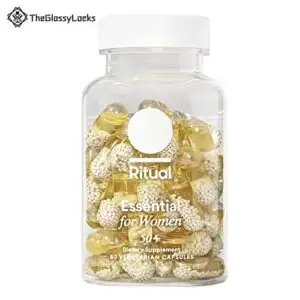
The Ritual Multivitamin for Women 50 Plus offers a thorough approach to supporting hair health through its eight key nutrients designed for postmenopausal women.
While not specifically marketed as a hair supplement, it contains essential vitamins like D3 and B12 that support healthy hair growth cycles.
The smart capsule technology separates fat-soluble and water-soluble nutrients for efficient absorption.
Third-party tested and free from common allergens, this vegan formula provides foundational nutrition that may help address age-related hair thinning concerns, utilizing smart capsule technology.
Best For: Women over 50 seeking a vegan multivitamin to support overall health, including immune, bone, and brain health.
- Contains 8 key nutrients tailored for postmenopausal women.
- Vegan, allergen-free, and third-party tested for quality and safety.
- Smart capsule technology ensures optimal nutrient absorption.
- Mint flavor may not appeal to everyone.
- No specific claim or proven impact on hair growth.
- Mixed feedback on capsule appearance and refund policy.
Preventing Hair Loss Naturally
While supplements provide targeted nutrition for hair health, you can also support your hair naturally through lifestyle modifications that address the root causes of hair loss.
These evidence-based approaches work alongside supplementation by optimizing your body’s natural hair growth processes through dietary improvements, stress management, and protective hair care practices, which can help support your hair health through lifestyle modifications.
Dietary Changes for Hair Growth
Beyond supplements, your fork holds real power over your hair’s destiny.
Calorie restriction and nutritional deficiencies can trigger hair loss, while strategic dietary changes support growth.
The Mediterranean diet, rich in nutrients that enhance iron absorption and combat iron deficiency, provides essential building blocks.
Adequate protein intake and proper hydration levels create ideal conditions for follicle health.
The diet may also influence hair health directly.
- Increase protein intake to 2-3 daily servings of lean meats or beans
- Follow Mediterranean diet patterns with omega-3 rich fish and vegetables
- Pair vitamin C foods with iron sources to boost nutrient absorption
- Maintain proper hydration levels with 8+ glasses of water daily
- Include zinc-rich foods like pumpkin seeds and shellfish regularly to support hair growth and overall well-being, ensuring proper hydration and a balanced intake of essential nutrients like zinc.
Reducing Stress for Hair Health
Chronic stress triggers elevated stress hormones like cortisol, which directly impacts your hair growth cycle.
Your stress hormones are literally stealing nutrients from your hair follicles every single day.
When you’re constantly stressed, scalp tension restricts blood flow to follicles, while poor sleep quality disrupts cellular repair processes.
| Stress Management Strategy | Hair Health Benefit | Implementation |
|---|---|---|
| Mindfulness Practices | Reduces cortisol levels | 10-minute daily meditation |
| Quality Sleep | Promotes cellular repair | 7-9 hours nightly |
| Scalp Massage | Relieves tension | 5-minute gentle circles |
Effective stress relief protects your hair’s natural growth patterns.
Avoiding Harsh Chemicals for Hair
When shopping for hair products, you’re basically choosing between chemical damage and gentle ingredients.
Harsh sulfates and parabens can trigger scalp sensitivity, leading to hair breakage repair needs.
Natural alternatives like coconut oil-based shampoos protect your follicles while DIY recipes using ingredients like honey provide nourishment.
Your hair supplements work better when you avoid products that counteract hair growth and hair strengthening vitamins.
Many people are now opting for clean beauty options for their hair.
Maintaining Healthy Hair
Taking supplements helps reduce hair fall, but maintaining healthy hair requires additional protective measures that preserve your existing strands.
You’ll need to combine regular trims with heat protection strategies to prevent mechanical damage that can undo the benefits of your nutritional support, using regular trims as part of your hair care routine.
Importance of Regular Trims
Regular trims don’t accelerate growth rate impact, but they’re essential for maintaining healthy hair by preventing breakage and split end removal.
Damaged ends travel up the hair shaft, compromising hair shaft strength and overall hair health benefits.
Here’s why trimming matters for hair damage prevention:
- Stops split ends from destroying your entire strand – like cutting a fraying rope before it unravels completely
- Maintains your hair’s shape – keeping you confident and put-together between salon visits
- Prevents costly hair breakage repair treatments – saving hundreds on intensive conditioning procedures
- Protects against environmental hair damage – creating a barrier against daily wear and tear
- Reduces hair breakage – maintaining length you’ve worked hard to achieve through consistent shape maintenance
Regular trims are crucial for the overall health and appearance of your hair, and by following these reasons, you can understand the importance of trimming in hair care.
Protecting Hair From Heat Damage
Heat styling tools can cause significant hair breakage when used at high temperatures.
Apply heat protectant sprays before styling to create a barrier against damage. Choose low heat styling settings whenever possible, as excessive heat weakens hair structure.
Maintain proper hydration and heat balance through deep conditioning treatments. Focus on repairing heat damage with strengthening products to prevent environmental damage and maintain healthy hair care routines.
You can also use leave-in conditioner for heat protection.
Frequently Asked Questions (FAQs)
What vitamins are good for hair loss?
B vitamins like biotin and B12 strengthen your hair follicles, while vitamin D supports healthy growth cycles.
You’ll also benefit from vitamin C for iron absorption and vitamin E for scalp circulation protection.
Can vitamins help reduce hair fall?
Picture your hair follicles as tiny factories working overtime.
Yes, vitamins can substantially reduce hair fall by addressing nutritional deficiencies that weaken strands, supporting healthy growth cycles, and strengthening your hair’s foundation.
Can hair growth supplements help thinning hair?
Hair growth supplements can help thinning hair when nutrient deficiencies are the cause.
You’ll need biotin, vitamin D, iron, and zinc for best results.
Expect 3-6 months before seeing improvements.
Should you take supplements for hair loss?
Throwing money at thinning hair with random supplements won’t magically restore your mane.
You should take targeted supplements only if you’re deficient in key nutrients like biotin, iron, or vitamin D after proper testing.
What vitamins are good for hair growth?
B vitamins like biotin and B12 strengthen your hair’s structure, while vitamin D supports follicle health.
You’ll also benefit from vitamin C for iron absorption and vitamin E for scalp circulation protection.
What are the best supplements for hair fall?
Top supplements for reducing hair fall include biotin (2,500-5,000 mcg daily), iron for oxygen delivery, vitamin D (1,000-2,000 IU), zinc for tissue repair, and B-complex vitamins.
You’ll see results within 3-6 months of consistent use, which can be attributed to the combined effects of these supplements, particularly vitamin D.
What is the best supplement to take for hair loss?
While countless products promise miracles, biotin stands out as your most reliable ally.
You’ll find 2,500-5,000 mcg daily supports keratin production effectively.
However, combining iron, vitamin D, and zinc creates a thorough approach that addresses multiple hair loss pathways simultaneously.
Which vitamin is best to stop hair fall?
Biotin stands out as the top vitamin for stopping hair fall, supporting keratin production directly.
You’ll also benefit from vitamin D and iron, which address common deficiencies that trigger excessive shedding in many people, making biotin a key factor.
What vitamin am I lacking if my hair is shedding?
Studies show 80% of women with hair loss have iron deficiency.
You’re likely lacking iron, biotin, vitamin D, or zinc.
These nutrients support follicle health and keratin production, so deficiencies trigger increased shedding, which can be related to hair loss.
What am I lacking if my hair is falling out?
Hair loss often signals deficiencies in iron, biotin, vitamin D, or zinc.
You might also lack adequate protein or B-complex vitamins.
Poor nutrient absorption from digestive issues can worsen these deficiencies substantially, often involving a lack of protein.
Conclusion
Remember, your hair’s health reflects your body’s nutritional status, making supplements to reduce hair fall a strategic investment in your appearance and confidence.
These seven science-backed options target the root causes of thinning hair through essential vitamins, minerals, and specialized compounds.
You’ll see the most significant results when you combine quality supplements with a balanced diet, stress management, and gentle hair care practices.
Consistency remains key—give your chosen supplement regimen 8-12 weeks to demonstrate measurable improvements in hair density and strength.

